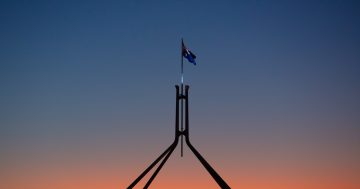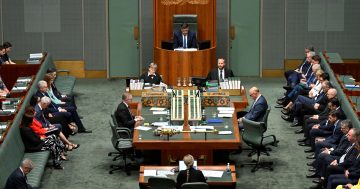
Severe penalties are on the way for MPs who don’t report complaints of sexual harassment. Photo: File.
MPs, Senators and senior staff working inside Parliament House could get hit with huge fines, and the prospect of jail if they don’t pay them, for not reporting complaints of workplace harassment and bullying, if a government Bill introduced yesterday (August 21) is passed.
Federal MPs could be fined up to five per cent of their salary and removed from parliamentary committees, or even be suspended from parliament, if found to have breached the new laws Labor hopes to bring in.
The government’s legislation for the Independent Parliamentary Standards Commission, which Region first reported about in May, holds severe consequences for misbehaving MPs and staff – although jail is not a likely outcome.
The IPSC is one of the outstanding key recommendations of the Set the Standard report former sex discrimination commissioner Kate Jenkins delivered in the wake of the alleged rape of Brittany Higgins.
The body will formalise and enforce codes of conduct for parliamentarians and staff.
It will be an independent workplace investigation and sanctions framework that will enforce behaviour codes for parliamentarians, Members of Parliament (Staff) Act (MOPS) and others who work in Commonwealth parliamentary workplaces.
Draft behaviour codes for members of parliament and their staff were endorsed in principle in February 2023 and will be formally adopted following the passage of the IPSC legislation.
These codes set out expectations for behaviour, including requirements to foster respectful and inclusive workplaces, and a prohibition on bullying, harassment, sexual harassment and assault, and discrimination.
Finance Minister Katy Gallagher said the IPSC legislation delivered on Recommendation 22 of the Set the Standard report, with improving the culture at Parliament House being a cross-party effort.
“The 2021 Set the Standard report laid bare the serious issues of bullying, sexual harassment and sexual assault at parliamentary workplaces,” Senator Gallagher said.
“Since coming to government and in conjunction with the Parliamentary Leadership Taskforce, we’ve been working hard to put the systems in place so that people can raise workplace complaints and, when complaints are substantiated, that both staff and parliamentarians are held to account for their behaviour.
‘‘I thank members of the Parliamentary Leadership Taskforce and staff consultative group for their feedback and collaboration in good faith as we have prepared this legislation for introduction. I look forward to working across the parliament to pass this legislation as soon as possible.”
The types of sanctions imposed will vary depending on whether the respondent is a current or former parliamentarian, MOPS employee or other parliamentary workplace participant, such as Press Gallery journalists.
An initial $3.8 million has been committed to establish the IPSC from 1 October this year, subject to the passage of legislation.
Parliament has already established the Parliamentary Workplace Support Service through legislation, and it has been allocated funds for the IPSC.
Initial consultation on the IPSC referred to the commission as a ‘disciplinary body’ and said employers must report allegations of assault, bullying, sexual harassment and all forms of discrimination.
It suggested reports must be made even without the complainants’ consent under the Work Health and Safety Act, which requires employers to ensure the workplace is always safe.
The sanctioning of parliamentarians provisions could prove problematic for the IPSC legislation, despite the bipartisan taskforce that has been working on it.
Some elements of the Bill have already been diluted from what was originally discussed during the consultations, and crossbench support for the legislation is not guaranteed.
The Parliamentary Workplace Support Service (Consequential Amendments and Transitional Provisions) Bill 2023 passed both houses of parliament last year and gives effect to recommendations of the Jenkins Review by establishing the Parliamentary Workplace Support Service as an independent statutory agency.
It is to provide “human resources and certain other services” for parliamentarians and persons employed under the Members of Parliament (Staff) Act 1984.
The bill also established the Parliamentary Workplace Support Service Advisory Board and the Parliamentary Workplace Support Service Consultative Committee.
Former prime minister Scott Morrison initiated the Jenkins review in 2021, and a review of “procedures and processes relating to serious incidents in the parliamentary workplace” was conducted by then deputy secretary of the Department of the Prime Minister and Cabinet, Stephanie Foster.
Reporting first, the Foster review focused on “immediate, practical steps that could be taken to better support those affected by workplace incidents”.
It was in direct response to the Higgins allegations and several other reports of mistreatment by MPs and political and parliamentary staff.
“The review found that the current procedures and processes are not designed or able to respond appropriately to serious incidents in the parliamentary workplace, particularly to sexual assault,” Ms Foster noted in her report.
Original Article published by Chris Johnson on Riotact.









